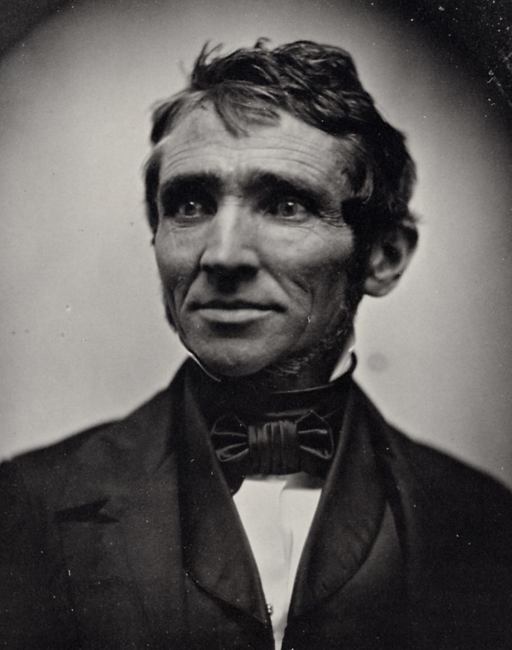
Charles Goodyear, the grandfather of modern tyre chemistry.
Southworth & Hawes, Public domain, via Wikimedia Commons
Let’s say that you live in Oxford and decide to nip down to Devon for the weekend. In your modern car, traffic aside, it takes just a few hours. You travel in relative comfort, without the exhausting, bone-jarring journey that your ancestors would have thought normal. None of this would be possible without the super-compound used in all modern tyres – vulcanised rubber.
Let’s meet its inventor, Mr Charles Goodyear.
Iron tyres for 2,000 years.
We begin with a bit of context. For most of recorded human history, we got around on wooden wheels. These gave exactly the sort of ride you would expect and wore out like nobody’s business.
Eventually, clever thinkers hit on the idea of using some other material to cover the outside of the wood. At first, this was leather, but iron-rimmed wheels started appearing somewhere between 1000 BC and 100 BC. To fit this, the iron hoop was heated and placed around the outside of the wheel. As it cooled, the hoop contracted, gripping the wheel’s circumference. As tech improved, steel was used.
Eventually, all-metal wheels came into common use. This was great for wheel durability, but not necessarily for passengers.
What the world needed was something more flexible to put round our wheels.
The Incredible Charles Goodyear
Nice, bouncy rubber was a natural candidate for use in tyres. Unfortunately, it has some key drawbacks:
- it’s not very strong
- it’s not durable
- it oxidises and degrades quickly.
By the middle of the nineteenth century, industrialists were worked hard at improving rubber’s natural properties for use in all sorts of applications.
At this moment, along came Charles Goodyear, a self-taught American chemist. After many, many, many experiments, Goodyear accidentally heated rubber with sulphur, and in doing so produced a ground-breaking new compound – a substance which kept many of the advantages of rubber, but is far tougher and chemically resistant.
Today, we call it vulcanised rubber, and we wouldn’t have modern tyres without it.
Cheated out of his patent?
Goodyear never got the patent on his world-beating tech. It appears that Stephen Moulton, an agent for Goodyear, shared samples with a certain Thomas Hancock. The latter then registered the patent just eight weeks before Goodyear.
By the way, if the surname Moulton sounds familiar, that’s because it’s the same guy who lends his name to Moulton bicycles and whose rubber ventures morphed into Avon tyres.
Did British skulduggery steal the American’s hard work? Well, not necessarily. Hancock was an old hand at rubber research himself, and in the court case over the patents, several chemists testified that he couldn’t possibly have copied Goodyear’s process just by investigating the sample. However, he might well have figured the vulcanisation process because the samples smelled of rubber.
It’s unlikely that we’ll ever get to the bottom of this dodgy business, but we can say for certain that things didn’t turn out well for Charles.
Rewarded by history, not so much by life
In his pursuit of rubberised perfection, Charles Goodyear spent a fair portion of his life fiddling about with incredibly nasty chemicals. These undoubtedly took a toll on his health. He also suffered terrible financial setbacks, losing all of his money in a financial crisis.
The final blow was particularly cruel. In the summer of 1860, Charles travelled to New York to see his dying daughter. When he arrived, he discovered he was too late, collapsed, and died soon afterwards. He was 59.
Goodyear is recognised as a key innovator and inventor and was inducted into the US National Inventor’s Hall of Fame in 1976. Thirty-eight years after Goodyear’s death, Frank Seiberling made use of the inventor’s name when he founded the Goodyear Tire and Rubber Company.
About his lack of financial success, Charles Goodyear had this to say:
The advantages of a career in life should not be estimated exclusively by the standard of dollars and cents, as is too often done. Man has just cause for regret when he sows and no one reaps.
So, the next time you arrive safe and sound after a long trip on your super-durable vulcanised rubber tyres, why not give old Charlie a tip of the hat?
The BK Tyres blog carries news, views and information on tyres and related subjects. BK Tyres supplies and fits tyres throughout South Oxfordshire, including the communities of Abingdon, Didcot and Henley on Thames. As an independent, family run mobile provider, we provide exceptional levels of service and affordable prices. Contact us today.
